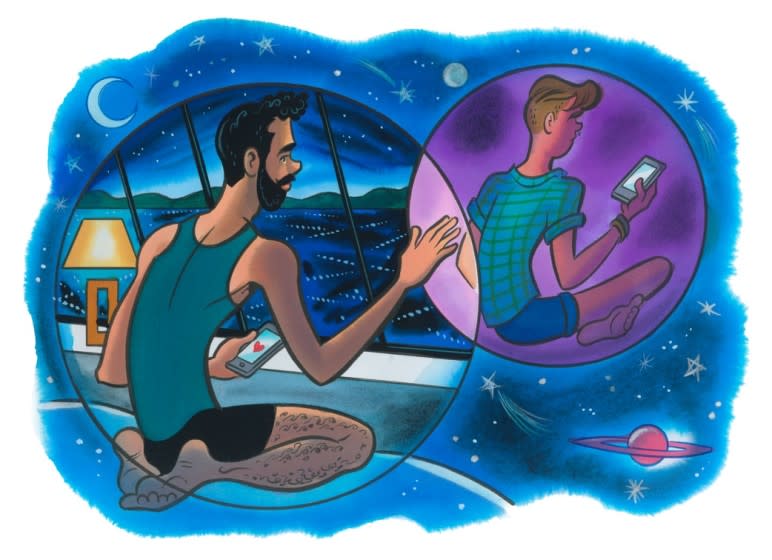L.A. Affairs: We hadn't met before stay-at-home. How would we hold on?

I've never really been the type of person to message a stranger online as a romantic gesture, even though that’s become the norm for people in my generation. My anxiety about coming off too emotionally intense and my fear of being rejected often prevent me from pursuing relationships in real life as well. But seeing that I was one year out of college, and stuck in a dating funk, I figured I might as well keep trying. I hoped something would eventually stick.
In February, before all the coronavirus chaos, I attempted to put myself out there by joining a Facebook dating page for young Jewish singles. As I scrolled through the page one day, a profile caught my eye: An attractive nonbinary California college student who uses the pronouns they/them/their. They had a septum ring, an admiration for the arts and an interest in environmental law. They used to dance and do slam poetry, our political views were similar, and they regularly participated in protests on their university’s campus.
I was hooked. I reached out. We connected.
The next few weeks were spent getting to know each other through exchanges about growing up in L.A., being bisexual and having disparate Jewish experiences (they grew up secular; I grew up in the Conservative denomination). Our conversations evolved to discussing our personal passions, our pop culture hot takes and our mutual love for Jaboukie Young-White — all while sending each other funny political memes.
Texting intensified the growing intimacy between us.
I became much more vulnerable with A. than with any sexual partner I’ve had. The liberating quasi-anonymity of the online world allowed me to divulge feelings and fantasies I wouldn’t otherwise. We shared our desires and our deal breakers through healthy, open and occasionally lewd dialogue.
A. was still in school in Northern California. We began to make plans for spring break, when A. would come home to Los Angeles and we could finally meet in person.
I was, of course, very down for that.
It would be perfect.
As March rolled around and the stay-at-home order in California was implemented, world events decided that wasn’t going to work out after all. Once coronavirus hit college campuses and stoked worldwide concerns, A. ventured back to L.A. sooner than expected to stay with their family. Though we considered the tantalizing possibility of quarantine sex, A. and I agreed it would be too risky; I was a frontline worker with an elevated risk, and we were both worried about exposing vulnerable family members.
We decided to delay our consummation.
Even though we were closer than ever — mere miles from each other — I began to notice a change to our conversations. They seemed more tepid. There was less reciprocation. I’d tag A. in a meme or two; they’d respond with a sarcastic comment that seemed a little hostile. I’d text them to check in; they’d say they were fine and nothing more. At one point, we tried having phone sex, something we were both curious and eager to try, but neither of us was able to find a satisfying rhythm.
Clearly, there had been a shift.
Whether coronavirus had something to do with it or not, the pandemic certainly put a damper on things.
Two days after my birthday in April, I texted A. and asked, “Do you not want to talk to me anymore?” A few moments after I sent the message, I saw the text bubbles pop up ... then go away. Then come back. Then go away again. Finally, A. texted a confession: They had begun dating someone new. And that, no, they didn't want to talk to me anymore, at least not in the way we had been.
My reaction was shock.
You’re dating someone new?
In quarantine?
How is that even possible?
I knew that technically we weren't actually dating. (I mean, we had yet to meet in person.) We certainly hadn't had the "Is this exclusive?" conversation. The lack of contact in the weeks prior did prepare me for bad news, so I wasn't completely blindsided.
But it still hurt.
I decided to take the message in stride: I responded that I understood and thanked them for being transparent. A. reacted to my reply with a heart emoji.
And that was that for our short-lived, unusual online affair.
As for me? I struggled for perspective. The pandemic helped me understand how I want to approach relationships — with full honesty. I can still feel good that I found the confidence to reach out: I’d already taken the first step in navigating a digital romance.
All I have to do now is keep going.
The author is a Los Angeles-based screenwriter and freelancer, on Instagram and Twitter @samiamrosenberg. His website is samjrosenberg.com.
Straight, gay, bisexual, transgender or nonbinary — L.A. Affairs chronicles the search for love in and around Los Angeles, and we want to hear your story. The story you tell has to be true, and you must allow your name to be published, We pay $300 for each essay we publish. Email us at LAAffairs@latimes.com. You can find submission guidelines here.
This story originally appeared in Los Angeles Times.

